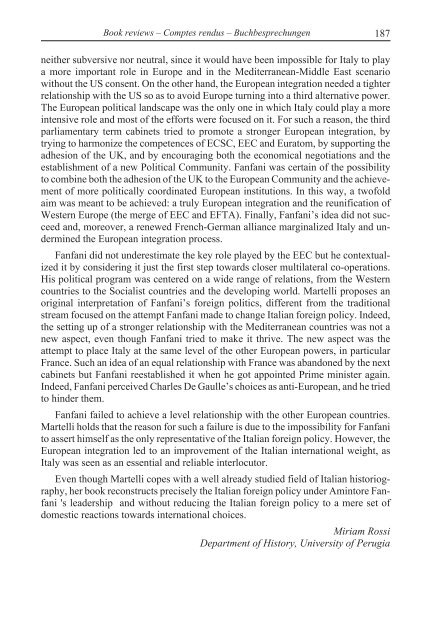Journal of European Integration History - Centre d'études et de ...
Journal of European Integration History - Centre d'études et de ...
Journal of European Integration History - Centre d'études et de ...
Create successful ePaper yourself
Turn your PDF publications into a flip-book with our unique Google optimized e-Paper software.
Book reviews – Comptes rendus – Buchbesprechungen 187<br />
neither subversive nor neutral, since it would have been impossible for Italy to play<br />
a more important role in Europe and in the Mediterranean-Middle East scenario<br />
without the US consent. On the other hand, the <strong>European</strong> integration nee<strong>de</strong>d a tighter<br />
relationship with the US so as to avoid Europe turning into a third alternative power.<br />
The <strong>European</strong> political landscape was the only one in which Italy could play a more<br />
intensive role and most <strong>of</strong> the efforts were focused on it. For such a reason, the third<br />
parliamentary term cabin<strong>et</strong>s tried to promote a stronger <strong>European</strong> integration, by<br />
trying to harmonize the comp<strong>et</strong>ences <strong>of</strong> ECSC, EEC and Euratom, by supporting the<br />
adhesion <strong>of</strong> the UK, and by encouraging both the economical negotiations and the<br />
establishment <strong>of</strong> a new Political Community. Fanfani was certain <strong>of</strong> the possibility<br />
to combine both the adhesion <strong>of</strong> the UK to the <strong>European</strong> Community and the achievement<br />
<strong>of</strong> more politically coordinated <strong>European</strong> institutions. In this way, a tw<strong>of</strong>old<br />
aim was meant to be achieved: a truly <strong>European</strong> integration and the reunification <strong>of</strong><br />
Western Europe (the merge <strong>of</strong> EEC and EFTA). Finally, Fanfani’s i<strong>de</strong>a did not succeed<br />
and, moreover, a renewed French-German alliance marginalized Italy and un<strong>de</strong>rmined<br />
the <strong>European</strong> integration process.<br />
Fanfani did not un<strong>de</strong>restimate the key role played by the EEC but he contextualized<br />
it by consi<strong>de</strong>ring it just the first step towards closer multilateral co-operations.<br />
His political program was centered on a wi<strong>de</strong> range <strong>of</strong> relations, from the Western<br />
countries to the Socialist countries and the <strong>de</strong>veloping world. Martelli proposes an<br />
original interpr<strong>et</strong>ation <strong>of</strong> Fanfani’s foreign politics, different from the traditional<br />
stream focused on the attempt Fanfani ma<strong>de</strong> to change Italian foreign policy. In<strong>de</strong>ed,<br />
the s<strong>et</strong>ting up <strong>of</strong> a stronger relationship with the Mediterranean countries was not a<br />
new aspect, even though Fanfani tried to make it thrive. The new aspect was the<br />
attempt to place Italy at the same level <strong>of</strong> the other <strong>European</strong> powers, in particular<br />
France. Such an i<strong>de</strong>a <strong>of</strong> an equal relationship with France was abandoned by the next<br />
cabin<strong>et</strong>s but Fanfani reestablished it when he got appointed Prime minister again.<br />
In<strong>de</strong>ed, Fanfani perceived Charles De Gaulle’s choices as anti-<strong>European</strong>, and he tried<br />
to hin<strong>de</strong>r them.<br />
Fanfani failed to achieve a level relationship with the other <strong>European</strong> countries.<br />
Martelli holds that the reason for such a failure is due to the impossibility for Fanfani<br />
to assert himself as the only representative <strong>of</strong> the Italian foreign policy. However, the<br />
<strong>European</strong> integration led to an improvement <strong>of</strong> the Italian international weight, as<br />
Italy was seen as an essential and reliable interlocutor.<br />
Even though Martelli copes with a well already studied field <strong>of</strong> Italian historiography,<br />
her book reconstructs precisely the Italian foreign policy un<strong>de</strong>r Amintore Fanfani<br />
's lea<strong>de</strong>rship and without reducing the Italian foreign policy to a mere s<strong>et</strong> <strong>of</strong><br />
domestic reactions towards international choices.<br />
Miriam Rossi<br />
Department <strong>of</strong> <strong>History</strong>, University <strong>of</strong> Perugia

















